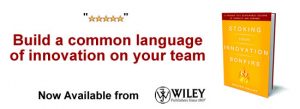Cut Your Jargon Emissions
 It’s getting to that time of the year when people are makng New Year’s Resolutions. For anyone working in business, here’s an idea: let’s try and make 2010 the year of plain English. A good way to start would be to read George Orwell’s 1946 essay, Politics and the English Language. Orwell understood how language could be used a weapon against the powerless, and how jargon and cliches are used to hide meaning, not clarify it. He offers six timeless rules for effective communication:
It’s getting to that time of the year when people are makng New Year’s Resolutions. For anyone working in business, here’s an idea: let’s try and make 2010 the year of plain English. A good way to start would be to read George Orwell’s 1946 essay, Politics and the English Language. Orwell understood how language could be used a weapon against the powerless, and how jargon and cliches are used to hide meaning, not clarify it. He offers six timeless rules for effective communication:
- Never use a metaphor, simile, or other figure of speech which you are used to seeing in print.
- Never use a long word where a short one will do.
- If it is possible to cut a word out, always cut it out.
- Never use the passive where you can use the active.
- Never use a foreign phrase, a scientific word, or a jargon word if you can think of an everyday English equivalent.
- Break any of these rules sooner than say anything outright barbarous.
I am not 100% on number 6, and here’s another one for people in business:
- Try and express your thoughts in one breath.
MBA-speak started by infecting the workplace but has tragically made its way into sport (losing teams now “lack accountability”) and even the home (KPI’s in the kitchen!).
- Why do we have to touch base to get our ducks in a row when we could just meet?
- Why must we synergize our learnings going forward, when comparing notes would do fine?
- Why wouldn’t a busy person save time by saying “I’m busy” instead of due to cascading workflow, I am lacking in requisite bandwidth?
- Why reach out when you can just make a call?
- Why can’t we leave a meeting with things to do, rather than take-home actionables?
Communication is about accountability. If we express ourselves clearly, we have no choice but to stand by what we say. By resorting to cliches and jargon, people are blurring meaning to avoid scrutiny. It’s also laziness.
People are hungry for clarity and authenticity. In every part of life, let’s commit to using language to amplify meaning, not bury it.
 Kevin Roberts is the CEO worldwide of The Lovemarks Company, Saatchi & Saatchi. For more information on Kevin, please go to www.saatchikevin.com. To see this blog at its original source, please go to www.krconnect.blogspot.com.
Kevin Roberts is the CEO worldwide of The Lovemarks Company, Saatchi & Saatchi. For more information on Kevin, please go to www.saatchikevin.com. To see this blog at its original source, please go to www.krconnect.blogspot.com.
NEVER MISS ANOTHER NEWSLETTER!
LATEST BLOGS
What happened to smart advertising?
For a television advertisement to be effective, do you need to lay out everything for the viewer and make it obvious? Or, is an advertisement more memorable if you let the viewer connect the dots themselves? Here are two examples of television advertisements that promote the product in a slightly more intellectual/emotional way that promotes engagement and curiousity:
Read MoreInvention versus Innovation
Continuous innovation requires that innovation is placed at the center of the organization and that all parts of the organization are changed to support it. To effectively place innovation at the center of the organization, people must know what innovation is, what it looks like in their organization, and how they can contribute. Most people easily confuse invention with innovation, and wrongly chase invention in the name of innovation.
Read More


